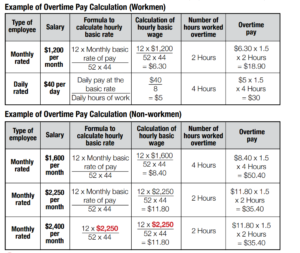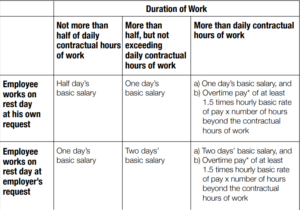Table of Contents
Hiring employees in Singapore is definitely not infringing on any laws. However, before do you so, are you aware that as an employer, you have to fulfill certain obligations under the Singapore Employment Act in your job agreement before signing?
On top of detailing the minimum terms and conditions of employment, the Employment Act also spells out the rights and responsibilities of both employers and employees under a contract of service. Moreover, if your employee is a Singapore Citizen or Singapore Permanent Resident, you as an employer are required to pay Central Provident Fund (CPF) contributions for them.

Here is an overview of the Singapore Employment Act that you, as an employer, need to be aware of.
Who is Covered by the Employment Act?
The Employment Act covers every employee (regardless of nationality) who is under a contract of service with the employer. However, the Employment Act does not cover the following employees:
- Managers and executives who earn basic monthly salaries of more than S$4,500
- Seafarers
- Domestic workers
- Statutory board and government employees
Calculating Payment of Salary
You should pay your employees salary and overtime pay at least once a month as per employment laws in Singapore. Salary has to be disbursed to employees within 7 days after the end of the salary period. Overtime pay has to be paid to employees within 14 days after the end of the salary period.
Employee must be paid 1.5 times basic rate of pay per hour. The overtime can be calculated as:
For workmen employed on a monthly rate of pay:
1.5 x number of hours of overtime worked x (12 x monthly basic rate of pay) / (52 weeks x 44 hours)
For non-workmen whose monthly basic rate of pay is less than $2,250:
1.5 x number of hours of overtime worked x (12 x monthly basic rate of pay) / (52 weeks x 44 hours) For non-workmen whose monthly basic rate of pay is $2,250 or more: 1.5 x number of hours of overtime worked x (12 x $2,250) / (52 weeks x 44 hours)

According to Part IV of the Employment Act, for a workman with a basic salary $4,500 or less or to a non-workman employee with a monthly basic salary less than $2,500, it is mandatory to make overtime payment.
Generally, the payment of salary should be paid on a working day and during working hours at the place of work or at any other agreed-upon location. It may also be paid directly into the employee’s personal bank account.
How to Calculate Salary Payable Upon Termination?
a) Termination of contract of service by the employer or dismissal on the grounds of misconduct:
- The employer must pay the total salary due to the employee on the last day of employment. If it is not possible, it must be paid within three working days from the date of termination/dismissal.
b) Termination of contract of service by the employee:
- If the employee has served the required notice period, the employer must pay the total salary due to the employee on the last day of employment;
- If the employee leaves employment without notice or without serving the required notice period, the employer must pay the total salary due to the employee within seven days from the last day of employment
Length of Working Hours
Under the Singapore Employment Act, your employees should not work more than 44 hours a week (excluding break time and overtime). Anything done in excess of the contractual hours is considered overtime work. Additionally, do note that overtime payment is at 1.5 times the hourly basic rate if you require your employees to work overtime.
Including overtime, the total working hours should not exceed 12 hours a day and total overtime must not exceed 72 hours a month.
Number of Rest Days
You should grant your employees at least one rest day every week without pay as employment laws in Singapore. Rest day can be Sunday or any other day of the week. If employee engaged in shift work, the rest day can be a continuous period of 30 hours if it is not possible to grant them one whole day off as a rest day.
If you require your employee to work on a rest day, you should pay them based on the terms specified under the Employment Act.

*The overtime rate payable to non-workmen employees is capped at the monthly basic salary level of $2,250.
Paid Leave for New and Part-Time Employees
Your employees are entitled to paid annual leave if they have worked at least 3 months for you. For new employees with less than a year length of service, they are entitled to prorated annual leave based on the months of service.
If you happen to hire part-time employees (those who work less than 35 hours a week under a contract of service), do remember that they are entitled to employment benefits such as paid public holidays, sick leave, annual leave and childcare leave. However, their entitlement should be prorated according to the number of hours worked by a similar full-time employee.
Four Different Types of Leave:
Public Holidays:
- An employee is entitled to 11 paid public holidays a year under the Employment Act
- When an employee is required to work on a public holiday , the employer should pay the employee an extra day’s salary or grant off in lieu
- If the holiday falls on a rest day, the next working day shall be a paid holiday
- If the holiday falls on a non-working day (or off day), the employer may decide to compensate the employee with an extra day’s pay in lieu of that holiday or give the employee another day off as a holiday.
Annual Leave:
- Employees with at least three months of service to employer are entitled to paid annual leave
- Annual leave should not be less than what is prescribed in the Employment Act.
Sick Leave
Under the Employment Act, your employees are entitled to paid outpatient sick leave and hospitalisation leave annually if they have:
- Served/Worked with the organisation for at least 3 months
- Obtained a medical certificate from the company doctor, company approved doctor or a government doctor
- Informed you of the sick leave within 48 hours
Do keep in mind that for new employees, the number of days of paid sick leave entitlement is prorated according to their service period.
Maternity and Childcare Leave
12 weeks of maternity leave should be entitled to an employee who is covered under the Employment Act. If the employee fulfils the following conditions, the first eight weeks of maternity leave will be paid.
a) The employee is employed for at least three months before the date of delivery;
b) Has less than two children at the time of delivery (unless these children were all delivered during the same pregnancy, e.g. twins or triplets); and
c) Gave the employer at least one week’s notice before going on maternity leave, and informed the employer of her delivery as soon as practicable.
If the conditions don’t meet only half pay will be entitled.
Part-time Employment
Under the Employment (Part-Time Employees) Regulations, a part-time employee is an employee who works less than 35 hours a week.
The employment act covers Part-time employees (excluding managers or executives earning a basic monthly salary of more than $4,500, domestic workers and seafarers).
Wages are set by market forces and should be determined by mutual agreement between the employees and their employers.
A part-time employee should be paid the following if he is required to work on a public holiday:
a) The basic rate of pay for one day’s work;
b) The amount he is entitled to for a public holiday; and c) One day’s travelling allowance if payable under his contract of service.
CPF Contributions
As an employer, you must pay CPF contributions to all employees who are Singapore Citizens/Singapore Permanent Residents (SPRs) earning more than S$50 per month. This is also applicable even if your employees are hired on a part-time/ad-hoc/contract basis or during their probation period.
Related readings: What are my CPF contribution obligations as an employer in Singapore?
The employer is required by law to contribute to the CPF of his employee:
- Any Singapore Citizen or Singapore Permanent Resident who is employed in Singapore under a contract of service by an employer excluding a master, a seaman or an apprentice in any vessel; or
- Any Singapore Citizen who is employed under a contract of service or other agreement entered into in Singapore as a master, a seaman or an apprentice in any vessel where the owners have not been exempted from the provisions of the CPF Act.
Employees include:
a) Company Directors;
b) Employees on concurrent employment;
c) Family workers;
d) NSmen on in-camp training;
e) Part-time Employees; and
f) Temporary/casual employees
Key Employment Terms (KETs)
- As an employer, you are required to issue key employment terms (KETs) in writing to all employees covered under the Employment Act.
- Essentially, these KETs can be issued in soft or hard copy and should be given to all employees within 14 days from the start of employment.
- Items to include in the KETs can be found on the MOM website.
Itemised Payslips
Likewise, you are required to issue all your employees itemised payslips to employees covered under the Employment Act. Details on what items to include can be found on the MOM website.
Consequences of Non-compliance
It is imperative to be familiar with the Employment Act to avoid incurring any unnecessary costs or non-compliance with these statutory laws.
Non-compliance of the Employment Act can result in a fine of between S$3,000 and S$15,000 and/or maximum of 6 months’ jail term.
Additionally, subsequent offenders are subjected to a fine of between S$6,000 and S$30,000 and/or maximum 12 months’ jail term.
If you have yet to familiarise yourself with the employment laws in Singapore, perhaps it is high time that you do so!
Claim your free trial. Start drafting legal documents with Zegal today.
This is a guest post from RenQun Huang at Gpayroll
Want to read more articles related to payroll, HR & technology? Visit us at Gpayroll
Alex Tanglao
Alex Tanglao is a seasoned professional with expertise in startups, legal technology, and business management. Alex has held leadership roles, including Director of Strategy & Operations at Elevate Digital, where he streamlined operations and managed teams, and Director of Ecommerce at Allies of Skin, driving global growth. Alex served as Marketing Manager at Zegal, driving legaltech and educating businesses on startup legal topics. With a background in content strategy from LawPath, Alex combines a deep understanding of legal services with operational excellence and innovative marketing strategies to help businesses thrive in dynamic, fast-paced environments.






